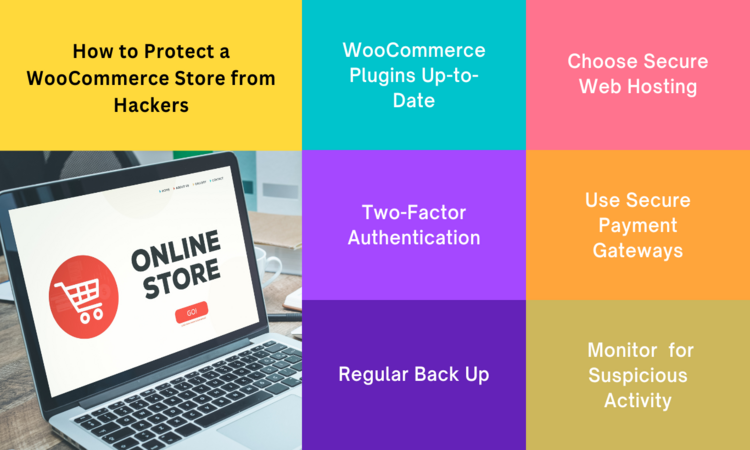If you’re a business owner, you’ve probably invested a significant amount of time and money into creating a beautiful and functional WooCommerce store. However, all your hard work can be undone in an instant if your store falls victim to a hacking attack. Hackers can steal your customers’ personal and financial information, compromise your website’s security, and damage your business’s reputation. Protecting your WooCommerce store from hackers should be a top priority for any online business owner. Here, you must be aware of how to protect a WooCommerce store from hackers. So, let’s get started!
Table of Contents
In this article, we’ll share essential tips and strategies for securing your WooCommerce store from potential security threats.
What is a WooCommerce Store?
A WooCommerce store is an e-commerce platform that enables you to sell your products & services online. This platform is a plugin for WordPress, which is a widely-used website-building tool. With WooCommerce, you can effortlessly establish an online store, upload your products and services, and handle orders and payments.
Customers can browse products, add them to their cart, and securely pay for them using a variety of payment options. Businesses can customize their store’s design, add product descriptions and images, and provide customers with important information like shipping details and return policies.
Related: How to Secure Your WordPress Website from Hackers?
Essential 7 tips to Protect a WooCommerce Store from Hackers
Here’re 7 essential ways on how to secure your WooCommerce store from hackers:
1. Keep Your WordPress and WooCommerce Plugins Up-to-Date
WordPress and WooCommerce plugins are essential components of your online store, as they provide the functionality and features you need to run your business effectively. However, these plugins are also frequent targets of hacking attacks, as hackers often search for vulnerabilities in outdated or unpatched software.
To protect your WooCommerce store from hackers, it’s crucial to keep your WordPress and WooCommerce plugins up-to-date. Plugin updates often contain bug fixes and security patches that address known vulnerabilities and improve overall performance.
You can update your plugins from the WordPress dashboard by navigating to the Plugins section and clicking the “Update” button next to any available updates. Alternatively, you can enable automatic updates for your plugins by installing a plugin like “Easy Updates Manager” or “WP Updates Settings.”
2. Choose Secure Web Hosting
Your web hosting provider plays a very important role in the security of your WooCommerce store. A secure web hosting provider should have strong security measures in place, such as firewalls, intrusion detection systems, and malware scanners.
When choosing a web hosting provider for your WooCommerce store, look for a provider that offers secure and reliable hosting services. You should also consider factors like server uptime, scalability, and customer support.
3. Implement Strong Passwords and Two-Factor Authentication
Weak passwords are a common entry point for hackers looking to gain access to your WooCommerce store. To protect your store from these types of attacks, it’s essential to implement strong passwords and two-factor authentication.
A strong password should be at least eight characters long and include a mix of uppercase and lowercase letters, numbers, and special characters. You can use a password manager like LastPass or 1Password to generate and store secure passwords.
Two-factor authentication is another layer of security that requires users to provide two forms of identification to log into their WooCommerce store. This could include something they know, like a password, and something they have, like a security token or a fingerprint.
You can enable two-factor authentication on your WooCommerce store by installing a plugin like “Google Authenticator” or “Duo Security.”
4. Use Secure Payment Gateways
Your WooCommerce store likely processes sensitive customer information, such as credit card details, during the checkout process. To protect this information from hackers, it’s crucial to use secure payment gateways that comply with industry standards.
Look for payment gateways that support HTTPS encryption and have PCI compliance, which ensures that your customers’ payment information is protected during transmission and storage.
5. Back Up Your WooCommerce Store Regularly
In the event of a hacking attack, having a recent backup of your WooCommerce store can be a lifesaver. Backing up your store regularly ensures that you can quickly restore your website to a previous version in case of data loss or corruption.
You can back up your WooCommerce store using a plugin like “UpdraftPlus” or “BackupBuddy.” These plugins allow you to schedule automatic backups and store them in secure cloud storage, such as Google Drive or Dropbox.
6. Monitor Your WooCommerce Store for Suspicious Activity
Regularly monitoring your WooCommerce store for suspicious activity can help you catch potential security threats before they cause significant damage. Look for unusual logins, failed login attempts, changes to your store’s files or settings, and unusual traffic spikes.
You can use a security plugin like “Sucuri Security” or “Wordfence Security” to monitor your WooCommerce store for suspicious activity. These plugins can send you alerts if they detect any unusual behavior, such as brute force attacks, malware infections, or unauthorized access attempts.
7. Train Your Employees on Cybersecurity Best Practices
Your employees can be your greatest security asset or your greatest security risk. It’s essential to train your employees on cybersecurity best practices to prevent them from inadvertently compromising your WooCommerce store’s security.
Provide your employees with guidelines on how to create strong passwords, recognize phishing scams, and avoid clicking on suspicious links or downloading attachments from unknown sources.
You can also limit employee access to sensitive areas of your WooCommerce store, such as the admin panel or payment processing pages, to reduce the risk of insider threats.
Also read: Benefits of Website Redesign Service and Strategy
Why Your WooCommerce Store Requires Greater Security
As online shopping becomes increasingly popular, WooCommerce stores have become a favorite target for hackers. It’s crucial for online business owners to take security measures seriously and implement them into their WooCommerce store.
Let’s know why you need greater security for your WooCommerce store:
1. Protecting Sensitive Customer Information
Hackers can steal sensitive customer information, such as credit card details, usernames, and passwords, and use them for fraudulent purposes. Securing your store is essential to prevent data breaches.
2. Website Vulnerability to Malware and Cyber-Attacks
Hackers can manipulate your website’s code, deface it, and install malware, leaving it vulnerable to future attacks. This could result in loss of revenue, business reputation damage, and your website being taken down.
3. Malware Can Infect Your Customers’ Devices
Malware can infect your customers’ devices when they visit your website, leading to damage or theft of their personal information. This could cause harm to your customers and potential legal issues for your business.
4. WooCommerce Store Owners’ Responsibility
WooCommerce store owners bear the responsibility of safeguarding their customers’ sensitive information and ensuring their website’s security. Failing to do so can lead to expensive legal fines and loss of customer trust.
5. The Impact of a Minor Security Breach
A minor security breach can significantly impact your business reputation and customer trust. Prioritizing security measures establishes trust with your customers and protects your brand image.
Related: Rewrite Custom Post URL With Taxonomy or Category Slug Appended
How to Identify a Hack on Your WooCommerce Store
Here are some ways to identify a hack on your WooCommerce store:
- Unusual activity: If you notice any unusual activity on your website, such as new user registrations, failed login attempts, or a significant increase in traffic or sales, it could be a sign of a hack.
- Strange pop-ups or advertisements: If you notice any strange pop-ups or advertisements appearing on your website, it could be a sign that your website has been compromised.
- Suspicious code: Check your website’s code for any suspicious or unfamiliar code that could indicate a hack. You can use a website scanner or security plugin to help you identify any suspicious code.
- Slow website performance: If your website is running slower than usual, it could be due to a hack. Malicious code can slow down your website’s performance, making it difficult for customers to use and damaging your business reputation.
- Google warnings: If you receive a warning from Google about your website being hacked or compromised, it’s essential to take immediate action to resolve the issue.
- Customer complaints: If customers report unusual activity on their accounts, such as unauthorized transactions, it could be a sign of a hack. You should take these complaints seriously and investigate immediately.
- Payment gateway notifications: If your payment gateway notifies you of unusual transactions or fraudulent activity, it could be a sign of a hack.
Related: How to Troubleshoot Website Downtime Issues?
Is WooCommerce Safer Than Shopify?
Comparing the safety of WooCommerce and Shopify is not straightforward since both platforms offer different security features and have varying degrees of susceptibility to hacking attempts. While WooCommerce is self-hosted and requires you to secure your own server, Shopify is a hosted solution with its security measures already in place.
However, both platforms prioritize security and regularly release updates to fix security vulnerabilities. Ultimately, the security of your online store depends on how well you implement security measures and follow best practices.
Also read: Choose the Right CMS for Your Website
Top Resources for Your WooCommerce Store
Try using the below resources for your WooCommerce store and secure your business:
10 Best Plugins for WooCommerce Stores:
| WooCommerce Multilingual | OptinMonster |
| WPForms | WooCommerce PDF Invoices & Packing Slips |
| YITH WooCommerce Wishlist | WP Mail SMTP by WPForms |
| Advanced Coupons for WooCommerce | Smart Coupons for WooCommerce |
| Product Add-Ons for WooCommerce | WOOF – WooCommerce Products Filter |
5 Best and Secure Hostings for WooCommerce Stores:
| Bluehost |
| SiteGround |
| WP Engine |
| DreamHost |
| Liquid Web |
5 Best and Secure Payment Gateways for WooCommerce Stores:
| PayPal |
| Stripe |
| Square |
| Authorize.Net |
| Amazon Pay |
Conclusion
Protecting your WooCommerce store from hackers is essential for the long-term success of your online business. By following the tips and strategies on how to protect a WooCommerce store from hackers, you can significantly reduce your store’s vulnerability to security threats.
Remember to keep your WordPress and WooCommerce plugins up-to-date, choose a secure web hosting provider, implement strong passwords and two-factor authentication, use secure payment gateways, back up your store regularly, monitor your store for suspicious activity, and train your employees on cybersecurity best practices.
With these essential measures in place, you can rest assured that your WooCommerce store is secure and that your customers’ personal and financial information is protected from potential security threats.



